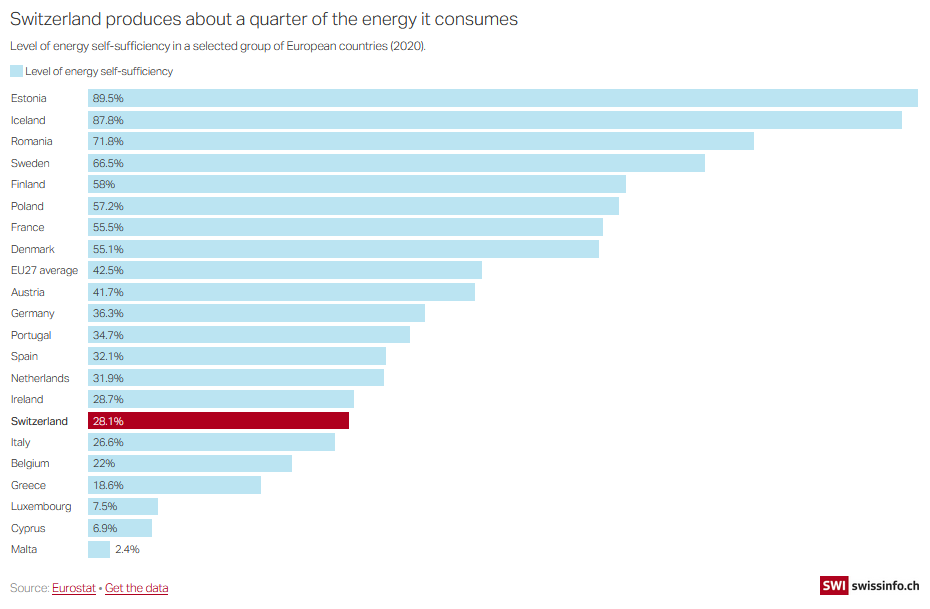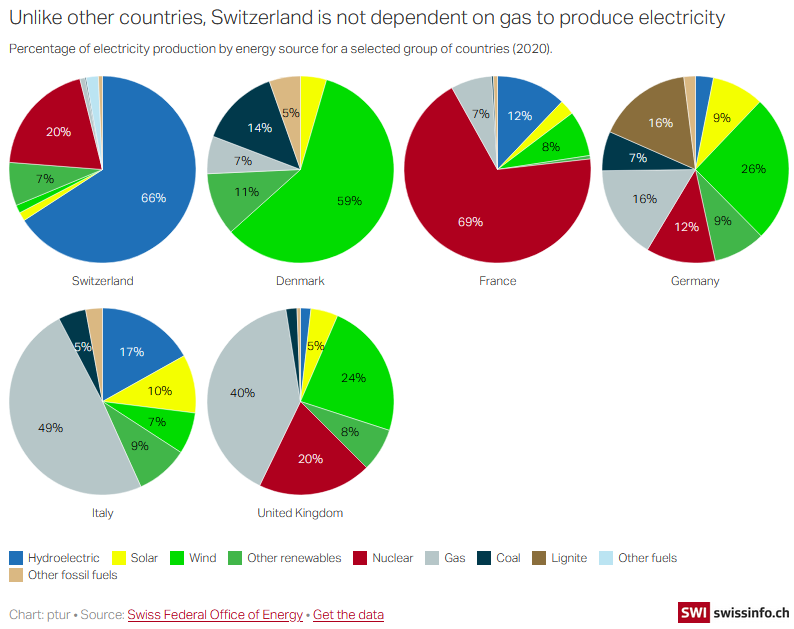Despite being one of the world’s richest countries, Switzerland also faces the threat of an energy shortage in the coming months. The authorities are scrambling to prepare. SWI swissinfo.ch has gathered answers to some of the most pressing questions on electricity supply, Switzerland’s dependence on Russian gas, and measures being taken to get the country through the winter. Is Switzerland self-sufficient in meeting its energy needs? No. Domestic electricity production covers only around 25% of the country’s energy needs. The remaining 75% is imported in the form of crude oil, petroleum products, gas and coal. Compared with other European countries, Switzerland is one of the least self-sufficient in terms of energy production.. Where does the electricity used in
Topics:
Swissinfo considers the following as important: 3.) Swissinfo Business and Economy, 3) Swiss Markets and News, Business, Featured, newsletter
This could be interesting, too:
Nachrichten Ticker - www.finanzen.ch writes Die Performance der Kryptowährungen in KW 9: Das hat sich bei Bitcoin, Ether & Co. getan
Nachrichten Ticker - www.finanzen.ch writes Wer verbirgt sich hinter der Ethereum-Technologie?
Martin Hartmann writes Eine Analyse nach den Lehren von Milton Friedman
Marc Chandler writes March 2025 Monthly
| Despite being one of the world’s richest countries, Switzerland also faces the threat of an energy shortage in the coming months. The authorities are scrambling to prepare.
SWI swissinfo.ch has gathered answers to some of the most pressing questions on electricity supply, Switzerland’s dependence on Russian gas, and measures being taken to get the country through the winter. Is Switzerland self-sufficient in meeting its energy needs?No. Domestic electricity production covers only around 25% of the country’s energy needs. The remaining 75% is imported in the form of crude oil, petroleum products, gas and coal. Compared with other European countries, Switzerland is one of the least self-sufficient in terms of energy production.. Where does the electricity used in Switzerland come from?The country’s 682 hydroelectric power plants provide more than half of the electricity consumed in Switzerland (61.5% in 2021). The rest comes from the country’s four nuclear power plants (28.9%), conventional thermal power plants (3.6%), and renewable sources such as solar energy and wind power (6%). During the summer months, Switzerland produces more electricity than it consumes. In winter, there is a drop in hydroelectric production, so electricity has to be imported from neighbouring countries, mainly France and Germany. |
|
How important is Russian gas for Switzerland?Switzerland does not have exploitable gas deposits of its own, and therefore depends entirely on imports. Gas accounts for around 15% of Swiss energy consumption (compared to 22% in the European Union), and about half of this comes from Russia. In Switzerland, natural gas is mainly used for heat production. Around one in five households heat their homes with gas in winter. |
What is the risk of an energy shortage this winter?
The threat of an electricity shortage in winter is not new. As Switzerland is not part of the EU and has so far failed to conclude a framework agreement on bilateral relations with Brussels, there had already been fears that the EU could shut off the electricity tap in case of a shortfall.
This year, however, the threat of a shortage is exacerbated by the general hike in energy prices, the forced shutdown of around half of France’s nuclear reactors (which supply electricity to Switzerland in the winter) and the prolonged drought. Low river levels, a lack of snowfall in the mountains, and scarce rain have brought water reserves in many hydroelectric basins to an all-time low.
The cutback in Russian gas supplies to Europe could also have an indirect impact on electricity in Switzerland. Countries such as Germany could well curb exports of electricity produced by their gas-fired power plants as a result.
With regard to gas, the possible shortage is directly linked to the war in Ukraine. Switzerland has no gas storage facilities of its own and, as mentioned above, depends entirely on imports. A shortfall in Europe would thus also be felt in Switzerland.
What measures are Swiss authorities taking to avert an energy shortage?
The federal government has introduced a gas storage plan in neighbouring countries as well as a voluntary gas savings programme aimed at reducing demand among households and businesses by 15% this winter. The authorities’ reliance on the population’s help to reduce consumption and save energy goes further. Late last month it launched a public information campaign, “Energy is scarce – let’s not waste it”, that encourages consumers to turn down their heating, use less hot water, and switch off unused electrical devices and lights.
In the event of a severe gas shortage, the government said it was prepared to take more drastic measures, such as limiting heating in homes to 19°C and banning gas heating in second holiday homes and swimming pools.
Many cantons have also set up energy taskforces and crisis management teams. Some cities have already announced plans to turn down heating and save electricity in public buildings, such as by reducing decorative Christmas lights.
How are other countries getting ready?
Some European countries have already announced restrictions and bans in order to cut back their gas and electricity consumption. Germany thus plans to outlaw floodlighting of buildings and historical monuments, limit heating in non-residential public buildings to 19°C, and forbid the heating of swimming pools.
In Spain, shop lights now have to be switched off at night, while France is set to ban illuminated advertising and is also preparing to ration electricity for businesses. No final decisions have been taken yet in Italy (the new government will do so after the elections on September 25), but heating restrictions, a reduction in street lighting at night, and the early closure of shops cannot be ruled out.
Adapted from Italian by Julia Bassam/gw
Tags: Business,Featured,newsletter


